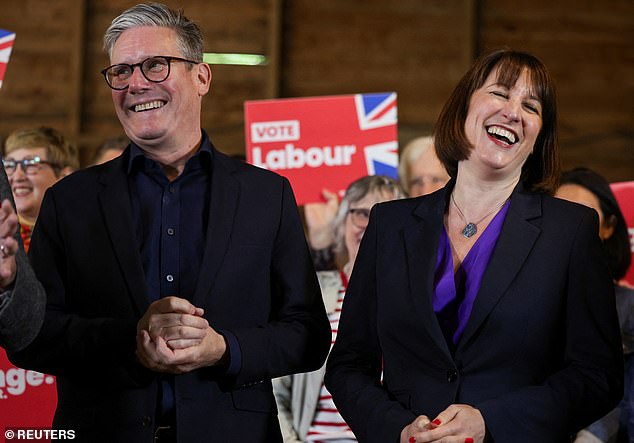Table of Contents
As Chancellor of the Exchequer Rachel Reeves offers a stark assessment of Britain’s finances, CHARLES WHITE-THOMSON, senior fellow at the Adam Smith Institute and former chief executive, says we need to start thinking like a business to generate the growth that can improve the UK’s position.
The pre-election Punch and Judy politics are now over. The Chancellor and the Prime Minister have been very clear that we will now get down to delivering the growth plan.
The aim is for the UK to have the highest sustained growth in the G7.
Growth is the driver of change, rather than further indebting the country or increasing an already historically high tax burden.
Objectives: Charles White-Thomson is the former chief executive of trading and investment firm Saxo UK
Our poor financial circumstances require this plan to be very detailed and well executed, as opposed to a wish on a magic money tree or some form of alchemy.
Achieving sustained growth is not easy and takes time. I welcome Sir Keir Starmer and Rachel Reeves’ commitment to putting growth at the top of their priority list, with a special focus on accountability, including “Mission Boards” where they monitor and hold themselves accountable for results.
This has a whiff of the private sector, where business plans are accompanied by clear outcomes and CEOs and CFOs are judged, rewarded or punished on their performance against these key objectives.
Businesses simply do not function if the fundamental objectives that drive growth, efficiency and profits are not strictly met.
The private sector often talks about the “devil being in the detail”. This is one area where the UK’s growth plan falls short and requires immediate action.
This observation has also been taken up by the IFS, which speaks of a “conspiracy of silence” when referring to this lack of detail.
Every major commitment or investment requires a numerical target and a delivery timeline.
Five-year goals are too vague and require annual review. A proactive approach and mechanisms for proper accountability are key components of success.
As a former CEO of a financial services firm, I was required to be granular and transparent about the company’s goals, which we referred to as key performance indicators (KPIs).
These KPIs were entered into an Excel sheet using a performance traffic light system and updated regularly.
Green when the KPI was met or exceeded, amber when the KPI was within 10 percent of target, red when the KPI was 10 percent or more off target.

Plan: Sir Keir Starmer and Chancellor Rachel Reeves have pledged to put growth at the top of their priority list, with a big focus on accountability.
This provided a simple and logical way to review the health of the business and where we were compared to our commitments or promises.
It also stimulated debate and discussion at monthly town hall meetings.
Similarly, the UK Government should immediately set out, and in some cases decide, and make public, what its key objectives are.
This should be available in one place rather than having to navigate a multitude of different department websites.
These should incorporate GDP per capita, inflation, budget deficit, debt interest payments, maximum spending on key spending commitments such as the NHS, taxation as a maximum percentage of net national income, immigration targets, new home building, recruitment of new teachers and infrastructure projects, to name a few.
This will provide an excellent executive summary for the Prime Minister to consider when updating the country’s situation.
It will drive greater accuracy, accountability and results. It will also ensure that the electorate is better informed and focused on our key performance drivers and how we are progressing.
Elsewhere, government agencies that do not contribute significantly to these objectives or, in the case of the OBR, are partly directly responsible for delivering more of the same, the status quo, should be disbanded or reformed.
The Government must urgently adopt best practices from the private sector.
As a UK shareholder, it is only right – indeed, it is essential – that you take a keen interest in how your money is spent and that you hold the Government rigorously to account on its business plan or key performance indicators.
If it fails to deliver, we should not be surprised by tax increases, more debt, broken promises and a continuation of trying to simply get by, as in Britain.
DIY INVESTMENT PLATFORMS

AJ Bell

AJ Bell
Easy investment and ready-to-use portfolios

Hargreaves Lansdown

Hargreaves Lansdown
Free investment ideas and fund trading

interactive investor

interactive investor
Flat rate investing from £4.99 per month

Saxo

Saxo
Get £200 back in trading commissions

Trade 212

Trade 212
Free treatment and no commissions per account
Affiliate links: If you purchase a product This is Money may earn a commission. These offers are chosen by our editorial team as we believe they are worth highlighting. This does not affect our editorial independence.
Some links in this article may be affiliate links. If you click on them we may earn a small commission. This helps us fund This Is Money and keep it free to use. We do not write articles to promote products. We do not allow any commercial relationships to affect our editorial independence.


